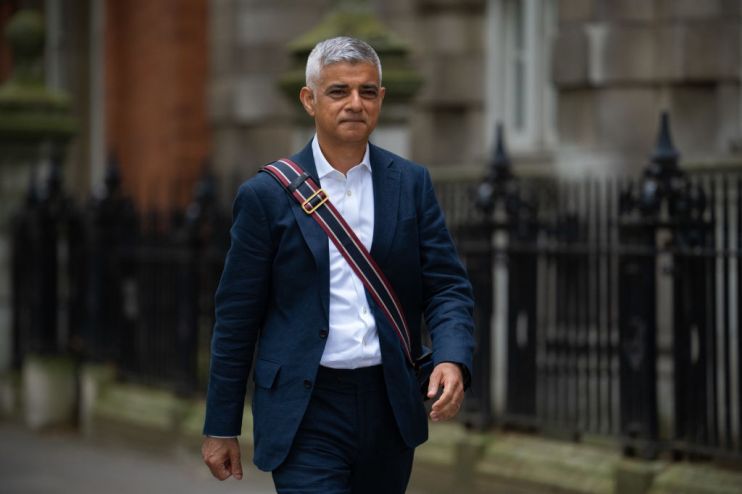Sadiq Khan’s London Growth plan is based on optimism (and little else)

Sadiq Khan’s grand plan for London is based on an optimistic fantasy of what a Labour government will bring, writes Eliot Wilson
Last week the mayor of London, Sadiq Khan, appeared alongside Rachel Reeves, the shadow chancellor, to unveil a “London growth plan” which will create 150,000 new jobs in the capital. Speaking at the Francis Crick Institute in King’s Cross, they promised growth in high-value sectors like finance, life sciences and retail.
Sadiq Khan faces a bid for re-election on 2 May. His victory seems assured, but he has one thing in common with Sir Keir Starmer, the Labour leader, which is that he is desperate not to seem complacent about his impending success. While Conservative candidate Susan Hall has conducted an accident-prone campaign, Khan knows that his own record is an unimpressive platform for a third term: knife crime is higher than the national average, half of Londoners think he has performed “badly” or “very badly” on gangs and homelessness and the introduction of the ULEZ emission-charging area has been mired in controversy and double-speak.
The optimism of the London growth plan is, therefore, a vital antidote to the sense of doom and dejection which shrouds British politics in the capital as elsewhere. 150,000 jobs is a great headline figure, and the promise of nebulous “change” under a Labour government can put the wind in the electorate’s sails.
On closer examination, though, Khan’s plans are a warm-feeling but indistinct mess of hope and ambition. One detail to be observed is that, even taking what the mayor says at face value, these jobs are only scheduled to be delivered by the end of a putative third term, in 2028. That seems a long way away right now.
More importantly, it ignores the very narrow powers the mayoralty actually possesses. The Greater London Assembly Act 1999, the longest piece of legislation for more than 60 years when it was passed, gave the mayor powers over transport, policing and the emergency services. He also controls “strategic planning”, essentially housing and the environment; and “economic development” through GLA Land and Property, an arms-length corporate body which owns 635 hectares of land in Greater London.
These are relatively modest levers for Khan to pull. He is essentially reliant on Whitehall, which he hopes will be controlled by Labour after a general election in October or November. Of his £20bn annual budget, more than half comes from Transport for London fares, a policing grant from the Home Office and a general grant of nearly £4bn from central government, with £1bn of capital borrowing. He retains 37 per cent of business rates, which amounts to £3.6bn.
There have been repeated calls for greater devolution to the Greater London Authority and the London Assembly. The London Finance Commission, an advisory body first convened by Boris Johnson, has advocated for greater fiscal powers for the mayor in 2013 and 2017. But, as I pointed out last week, Starmer’s proposals for constitutional reform and further devolution of powers from the centre contain no plans for London.
The London Growth Plan therefore boils down to Khan hoping that the existing institutions will somehow work better if he is co-operating with a Labour government. He talks of a “reset” of the relationship between Whitehall and City Hall, and Reeves promises “an end to the Tory government’s damaging and counterproductive approach of talking London down”.
But the detailed constitutional proposals of the Gordon Brown-chaired Commission on the UK’s Future referred to London almost entirely in negative comparative terms. ‘A New Britain: Renewing our Democracy and Rebuilding our Economy’ spoke again and again of the disproportionate economic weight and heft of the capital.
Khan seems to believe that the mood music of a new Labour government will be transformative, that existing institutions will suddenly deliver enormous growth, that a “better Brexit” deal will see investment rise and that a “pro-growth, pro-business Labour mayor and Labour government working hand-in-hand” will access “potential that can be untapped”.
“History is littered with examples of arrogant, complacent politicians,” Khan told his audience. “I ain’t one of those.” With no new powers to drive growth, Londoners will have to wait and see whether his sunny disposition is justified.